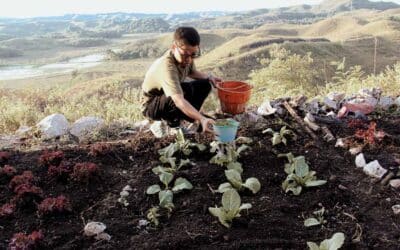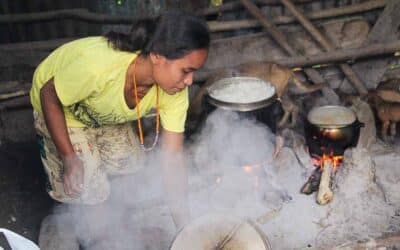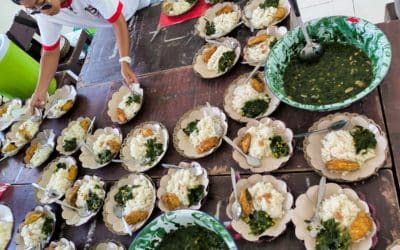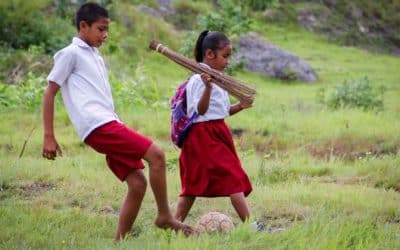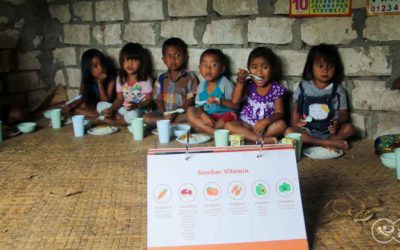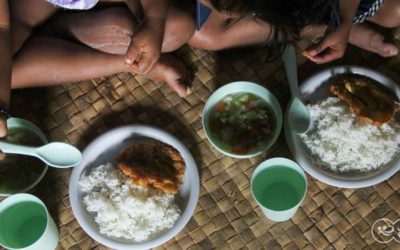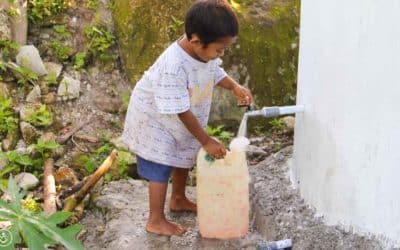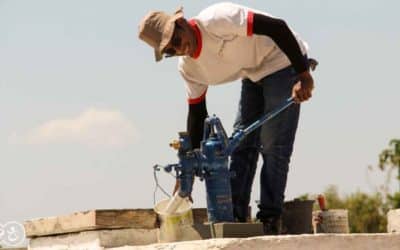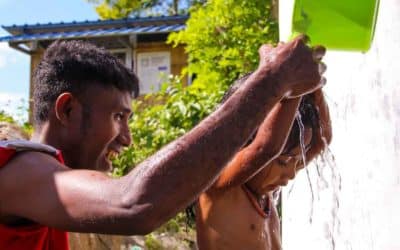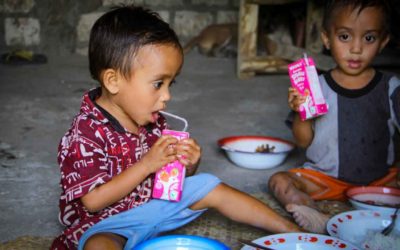Fair Future is an innovative initiative aimed at uplifting rural communities by focusing on two fundamental needs: access to clean water and education. By providing these essential resources, we empowers communities to establish and maintain vegetable gardens, which serve as a cornerstone for improved nutrition and health.
After years of walking to find dirty water, villages like Laindatang, Hambarita or Mbinudita can now access clean water from community reservoirs they built themselves. Clean water reduces diarrhea, skin infections, and fear. This is a true reflection of dignity in daily life.
Donate
Support Care
Programs
All projects
Quick News
Field updates
Stories
Field stories
Creating small gardens to improve nutrition and food security for families in ultra-rural Indonesia.
Discovering Local Food Resources for Healthier Lives
Fair Future actively supports ultra-rural communities with limited access to a diverse diet by raising awareness about local food resources. Our nutritionists teach families how to identify and prepare wild plants, fruits, and vegetables that are highly nutritious. Our programs contribute to child health, family resilience, and community building, while promoting sustainable living practices in areas where clean water and access to food are lacking.
Elma Joins Fair Future as Nutrition Expert
We are thrilled to announce that Elma, who has been with us for several months, will join our team as a nutrition expert. She will be integrated into our #PrimaryMedicalCare and healthy living programs. Elma’s expertise will greatly benefit rural communities, improving their health and well-being. Welcome, Elma!
Transforming Nutrition with Clean Water and Education
Fair Future and Kawan Baik are improving lives in rural areas by addressing malnutrition and poor health through clean water access and nutrition education. Our projects, including #WaterConnections, teach communities to grow and cook healthy foods, ensuring healthier lives for children and families. With support and guidance, we empower villages to improve their diets, health, and futures.
Four Pillars for a Healthier Life in Ultra-Rural Areas
Four Pillars for Healthy Living” serves as Fair Future’s guide for ultra-rural communities, emphasizing balanced lifestyle pillars: physical activity, nutrition, hygiene, and rest. This guide encourages daily exercise, a diet rich in fresh foods, regular washing with soap and water, and adequate rest for mental and physical health, aiming to enhance individual and community well-being.
Transforming Lives with Water and Nutrition in East Sumba
Fair Future and Kawan Baik are revolutionizing community health through clean water and nutrition education in this project in laindatang. This transformative action is not just about providing meals; it is about teaching sustainable living, promoting well-being and fostering self-sufficiency. Join us to fight malnutrition, empower communities and pave the way to a healthier future. Find out how we make good health accessible to everyone, despite difficult circumstances.
Combatting Malnutrition and Disease is Our Mission
Join us in our efforts to combat malnutrition and disease in the most rural areas. Fair Future and Kawan Baik have taken the initiative to bring positive change to the lives of people living in remote regions. We provide sustainable solutions to improve the nutrition and health of local communities. Our goal is to empower families, reduce infant mortality rates and create a better future for children. Let’s work together to make a meaningful difference!
Transforming Lives – Deep Drilling for Clean Water in East Sumba
In East Sumba, a 60-meter deep drilling project stands as a beacon of transformation. This gargantuan endeavor by Fair Future and Kawan Baik is not just about providing clean water; it’s a comprehensive approach to improve public health, education, and quality of life for over 2,000 people. This is where the battle against diseases like malaria takes a new turn, a testament to human resilience.
Dragon Pumps: Fair Future’s #WaterConnections in Laindatang
The arrival of Dragon pumps in Laindatang, East Sumba, marks a watershed moment in Fair Future’s #WaterConnections project. In collaboration with Kawan Baik and Rotary Australia, we are transforming the health landscape of this isolated village. From reducing the prevalence of infectious diseases to providing the first-ever sanitary installations, discover how clean water is rewriting the community’s story.
A healthier life thanks to the Water Connections program
This new "Picture of the Day" shows a delighted father who can now provide daily showers for his children, thanks to the newly installed water supply. Previously, they could only shower sporadically, sometimes only once a month. Additionally, the photo showcases the new sanitation facilities constructed in Mbinudita. The Water Connections project has successfully installed over forty reservoirs, thirty sanitary installations, three deep boreholes, and more than 15000 meters of HDPE pipes.
Water scarcity can be a significant source of stress for some regions, and various factors can cause it. Arid climates, low rainfall and prolonged droughts are just a few conditions that can contribute to water scarcity. Poor water resource management and a lack of knowledge can also exacerbate this problem, making it even more difficult for everyone to access the water they need to thrive.
Despite these challenges, Fair Future is working hard to address water scarcity and ensure people have access to this vital resource. That is why we have developed the Water Program Connections.
Fair Future and Kawan Baik have noticed a significant improvement in the behaviour of families who have benefited from the "Water Connections" initiative. This program has enabled people to grow gardens, consume healthier food, enjoy life more, reduce stress, and boost energy levels. As a result, there has been a marked decrease in illnesses.
Witnessing these positive changes fills us with joy and reinforces our conviction in our decisions. Fair Future and Kawan Baik Foundation have always aimed to improve individual health, and providing access to safe drinking water is a beautiful way to accomplish this objective. As a Medical Foundation, Fair Future Foundation understands clean water's significance for maintaining good health. Drinking enough clean and healthy water is crucial for various physiological processes, including body hydration, proper organ function, digestion, and elimination of toxins.
Access to clean and safe water prevents dehydration-related illnesses, such as urinary tract infections, kidney stones, and constipation. It also significantly prevents dehydration, particularly in hot areas where sweating and water loss through respiration are common. While water is necessary for maintaining good health, we understand better than anyone else that certain medical conditions may require alternative treatments.
Malnutrition is taking its toll here where we are
This "Picture of the Day" shows children in East Sumba, where we are at work, as I post this Photo of the Day. Fair Future and Kawan Baik teams, as part of the #kawansehat #primarymedicalcare and #waterconnections projects, cook for children in the most rural and poor areas. In this image, some are drinking strawberry milk for the first time. They had never seen a straw before, and I remember all the kids asking us how to drink that kind of drink. We had to show them and help them plant the straw in the milk carton.
Malnutrition is an endemic problem here in all the rural villages of East Sumba. It is also the region with the highest rate of malnourished children in Indonesia. Here, clean water is absent from the houses, and the consumption of unclean water generates health problems and serious illnesses. And to cook, drink, and wash, you need water. And in order not to get sick, you also need water. Food production cannot occur without water, and families do not have enough income to buy food, rice and vegetables. On average, they live with less than two litres of water per person per day for everything: cooking, eating, drinking, drinking, bathing, going to the toilet and doing laundry. Have you ever tried?
Most children here are underweight and malnourished because they cannot eat enough. Meal frequency is one meal per day. Young children may be able to eat twice if all goes well. The menu will consist of rice and corn because more than rice alone is needed. In East Sumba, a kilo of rice costs three times more than in Java or Bali. Only a little salt and peppers accompany the meal to give flavour and taste.
We have a toilet for the first time in our life!
This "Picture of the Day" shows you an adorable couple from East Sumba, the village of #mbinudita -who are not used to being photographed-. Beneficiaries of the #waterconnections program who have had access to toilets at home for a few hours. But not only toilets: They can shower there, wash their clothes, and create a vegetable garden. And most importantly, eat and drink healthily. No more getting sick from the water. No more spending hours on the paths to fetch a few litres of dirty water.
East Sumba is one of the regions in the world with the highest rate of malnourished children. Infant mortality due to lack of clean water and toilets is staggering. Our medical teams still spend much of their time giving medical treatment and medicine to people and children who don't have clean water to swallow. Or how to treat a child who suffers from diarrhoea by giving him tablets that he will have to drink with inedible water, the source of his illness? Say to cook the water? It has no wood; frankly, when you're thirsty, you drink what's there.
But here, things have changed dramatically. Over thirty healthy sanitation facilities and over forty clean water tanks have been built for these almost 280 #rebuildmbinudita families. Every week we see new vegetable gardens created, many more children going to school, including young girls, and more mothers looking after their families instead of walking for hours to fetch five litres of dirty water.



